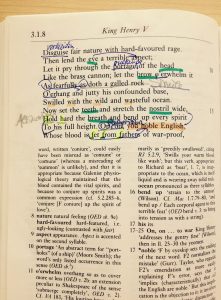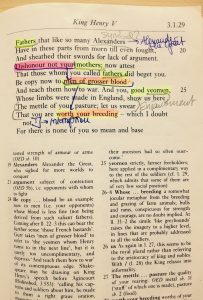I am an annotation lover! But there is a significant difference between my note-taking while close reading a text and my annotation while watching a film. When reading a play-text my pens are the most important utensils. One pen is not enough – I need several colored pens and highlighters. I have to admit that my annotation routine is not a very well structured approach, not a “one step at a time” process. It is more like chaos but I love writing down my thoughts and it sometimes feels like allowing my “stream of consciousness” to brisk up in form of notes, while I´m exploring the space between the lines.
For me a text without my personal notes is not a text that has a “Gestalt” and reminds me that I didn’t immerse myself fully in the diegetic world. Primarily my note-taking is confined to play-texts and poems, as I do think there is so much more that needs to be highlighted than for instance in a novel.
As English is not my first language, a dictionary is an important object of utility for me whenever doing literary criticism of English texts. Especially, when reading Shakespeare I rely on a dictionary a lot. This leads to one habit of my annotation practices: translation. In order to filter out the meaning of a Shakespeare text I underline all unknown words and search for them in my dictionary. Once found, I write the German translation above the English word or phrase. I do prefer translating some words but never the whole sentence, as I think translating Shakespearean English to German without “losing” the greatness and aesthetic of the English expressions is unfeasible.
What my professors back home recommend to us is buying a bilingual edition, where the original English text is always on the left pages and the German translation is on the right pages. But I am not a big fan of translation of Shakespeare texts into another language and therefore I am fine with “struggling” through the English text, although it takes some time. Paraphrasing is another practice that helps me to understand the meaning of complex lines but I only paraphrase it in my head.
Apart from my “translation note-taking” in consequence of English not being my first language, my favourite annotation habit is definitely coloring. I use one color for each semantic field I detect within a passage and paint all the words with a marker that can be classified with a certain category, for example sensory organs, as can be seen on the image below. Besides that, I also use colors for rhetorical figures and underline for instance a single repeated letters in order to be aware of the alliteration whenever I read the text again. In my opinion note-taking helps to understand the deeper meaning of the text faster, when re-reading it.


As already mentioned before, for my own part there is a significant difference between my annotation practices for a play-text and a film. Put simply: I hardly take notes while watching a Shakespeare film on screen. The reason why is that I feel distracted when directing my attention away from the screen. An option would be of course to pause and write down my thoughts but that would lengthen the film watching quite a bit. I also think that a film usually provides enough context and visual imagery in order to ensure the accesability of the play-text. My film notes taken in the Shakespeare 311 class are actually quite detailed, although I actually don’t like taking notes of a film. But given the fact that we only watch single scenes I break my usual “non-annotaion” routine and find my notes very helpful when reflecting a scene at home again. That´s why I also applied this succesfull strategy when watching Oliviers’ Henry V (1944). I was watching each scene seperately and annotated important things I had noticed before starting with the following scene.
In sum, I think note-taking is especially essential to understand the deeper meaning of any play-text. I have no doubt that my annotation practices are successful, as I would say they make itself felt whenever re-reading a play and entering the diegetic world from the very first line.
Leave a Reply
You must be logged in to post a comment.